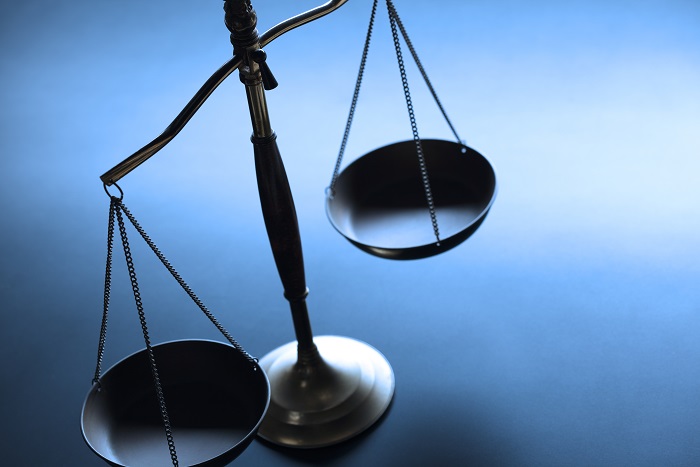
“You shall appoint magistrates and officials for your tribes, in all the settlements that Adonai your God is giving you, and they shall govern the people with justice. You shall not judge unfairly: you shall show no partiality; you shall not take bribes, for bribes blind the eyes of the discerning and upset the plea of the just. Justice, justice shall you pursue, that you may thrive and occupy the land that Adonai your God is giving you.”
- Deuteronomy 16:18-20
The Midrash states, “Rabbi Eliezer says, Where there is judgment, there is no judgment. Where there is no judgment, there is judgment." How so? He responds, "If the judgment is performed below, it will not have to be performed above. If a judgment is not performed below, it will have to be performed above.”
On its simplest level, this Midrash informs us of the importance of setting up courts. If mankind judges and punishes wrongdoers and protects victims and the oppressed, God will not have to do so.
When God judges an individual, it is not to punish or hurt him but rather to notify him that he needs to improve. Nevertheless, these notifications from God can sometimes seem like “punishments.” And we would prefer to avoid them. The Midrash tells us how If each person judges himself honestly and acts on his findings, he will not need to be judged above. However, if there is no judgment below, if man does not judge himself, he will have to be judged above.
This is addressed to each of the contending parties. The repetition of “justice” implies they should pursue a just result, whether it brings them profit or loss. Or perhaps it means they should continue to pursue justice time after time, as long as they live. Or it may simply be for emphasis.
Justice, justice... The rabbis say that if one hastens to give tzedakah, it is worth double as if one gave tzedakah twice. “Tzedek, tzedek” means that it will be considered as two tzedakahs if “you pursue” it, striving to give it as soon as possible.
Justice, justice you shall pursue... With justice, you shall pursue justice. Even the pursuit of justice must employ only just means and not falsehood.
There are moments in world history when social justice issues come to the forefront of global consciousness. This is such a time. The coronavirus pandemic uncovered and exacerbated social inequities. Closely related, due to its social justice component, is the expansion of Black Lives Matter into a worldwide movement with demonstrations against larger issues of racial inequality and systemic racism. Social justice plays a role in nearly every critical problem, from the climate emergency and voter suppression to gun violence and the widening income gap.
Society’s collective lens is now sharply focused on the disparity of experience among different social groups. People are energized regarding crucial issues such as LGBTQ+ legal protections, abuse of women, the rights of immigrants and indigenous peoples, racial discrimination, and more.
The Talmud suggests that the repetition of the word justice, tzedek, implies we must be just both in making a judgment and in reaching a compromise.
Moses insists that justice is an eternal religious obligation at the very core of what it means to be a Jew. And that insistence is not restricted to biblical Judaism.
In Midrash Devarim Rabbah, they explain that God loves justice even more important than sacrifice. This bears out what Scripture says. “To do what is right and just is more desired by the Lord than sacrifice.”
For all of these reasons, the Midrash affirms the centrality of justice as a Jewish calling. We cannot consider ourselves pious Jews without a firm commitment to making the world a more just and righteous place. How can we make the world do this? One way is through social action and justice.
There are many ways that individuals or groups can advance social justice in one’s community and throughout the world. Examine your beliefs and habits. Educate yourself about social justice issues. Discover local organizations. Take positive action in your community. Harness the power of social media. Attend demonstrations and protests. Volunteer, donate, and get involved with politics through civic engagement. And make your voice heard on local radio and television. Investigate what is happening at local colleges and universities. Invest responsibly and support minority-owned businesses in your community and online. Support artists, writers, and activists that speak out against injustice. Be kind, understanding, and compassionate.
Some of the resolutions that WRJ has instated since our inception as the National Federation of Temple Sisterhoods (NFTS) in 1913 can help make a difference. They include immigration (1915), family planning and contraceptives (1935), women’s rights, rights of individuals, crime and administration (1921), child/maternal welfare, child labor law enforcement, fair employment practices, international justice court, arbitration urged (1927), anti-lynching (1940), anti-poverty, crime and firearms (1967), plight of the oppressed (1943), hunger (1969), civil rights registration, electoral politics, the distinction between civil liberties and military functions (1938), sexual violence, pay equity, welfare reform, prevention of mass starvation, displaced persons, anti-poll tax, maintaining the integrity of the United States citizenship, immigration, protecting the environment, and economic justice.
(For an extensive list and more details, check out WRJ’s Resolutions, Statements, & Public Comments on WRJ’s website.)
Some of these topics started in 1913, and others are more recent. All are relevant. I charge you as an individual, family, sisterhood/women’s group, congregation, and community to seek justice for yourself and the larger community. Please feel free to use any of the above resolutions (or any other WRJ resolution that you find important) to help you thrive and leave behind a better place. Do so not just in words but in action as well.
Related Posts

Continuing to Educate and Empower People Together

My Challah-Making Experience

